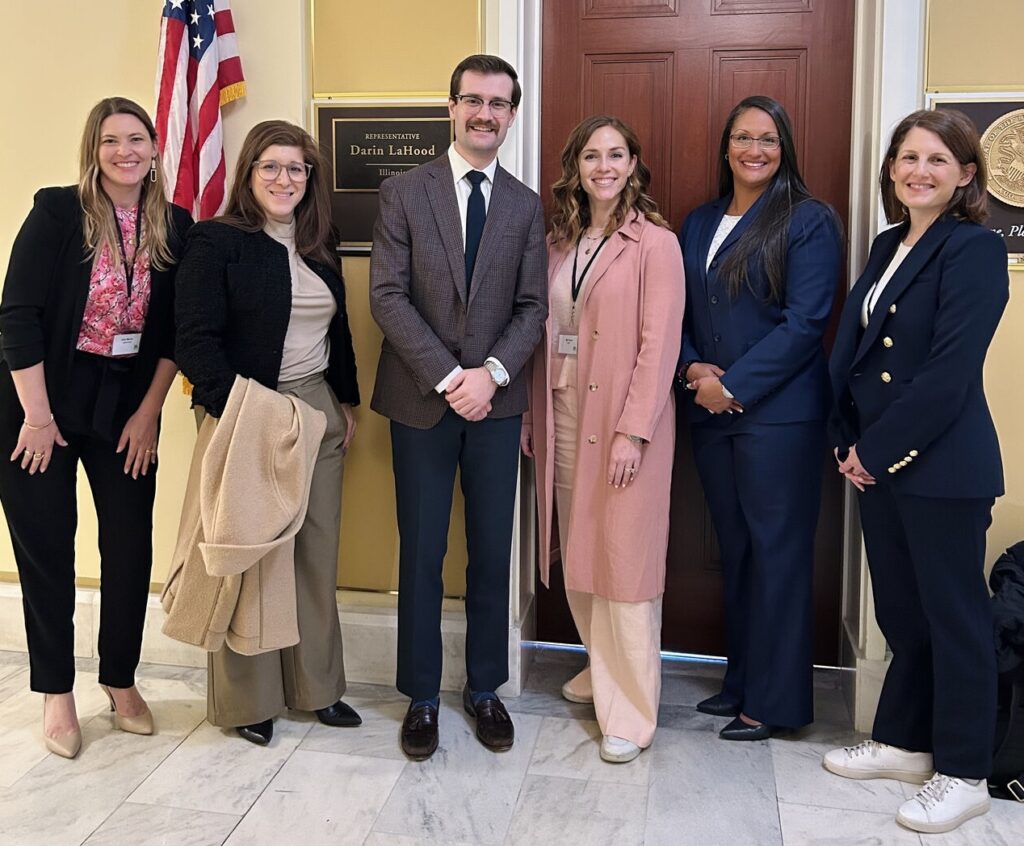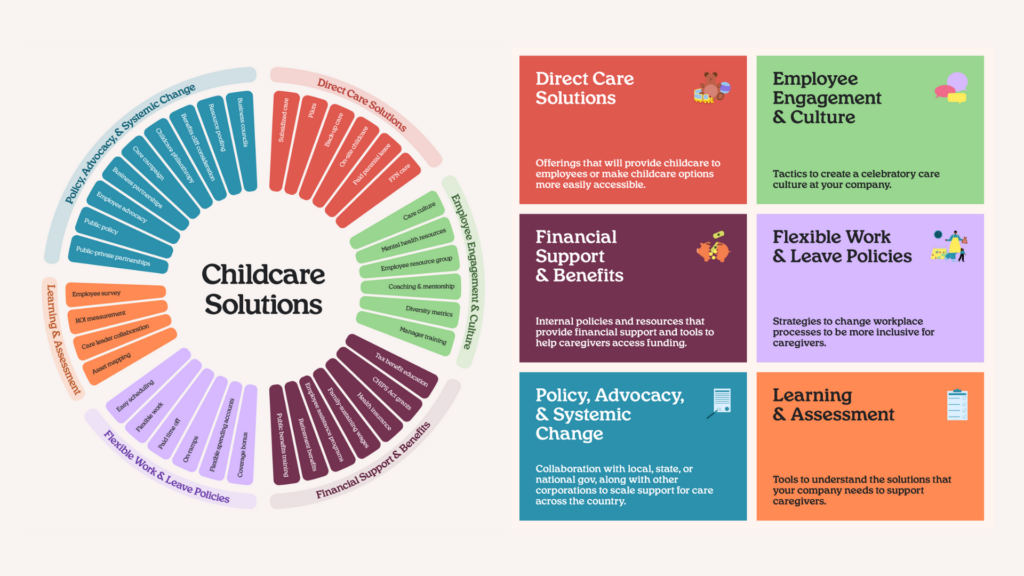Last month, I had the privilege of representing NationSwell at a first-of-its-kind gathering in Washington, D.C., where 50 business leaders came together alongside Moms First to advocate for one of the most urgent issues facing our workforce today: child care.
Together, we met with lawmakers from both sides of the aisle to make the business case for childcare, sharing stories and solutions from across the country. We rallied behind two critical bipartisan bills—the Child Care Availability and Affordability Act, and the Child Care Workforce Act—and left with a clear takeaway: there’s more common ground on this issue than most people realize.
Here are a few reflections I’ve brought back with me.

Allie Mahler and fellow childcare advocates in the U.S. House of Representatives
Child care is essential infrastructure
Child care isn’t merely a family issue – it’s essential economic infrastructure. Every year, the U.S. economy loses $122 billion due to child care breakdowns and disruptions from absenteeism, turnover, and productivity gaps.
As Reshma Saujani, Founder & CEO of Moms First put it, “Childcare is the linchpin of economic security.” For families, the cost of child care now exceeds rent in all 50 states, with Americans spending an average of 24% of their annual income on child care expenses. And for employers, inaction means losing critical talent – and having to compensate for turnover and hiring.
Companies that have stepped up are already seeing measurable returns. Toyota found that even a 1% improvement in workforce retention covered the cost of its child care program. At UPS, a pilot program across 7 sites saw a 70% reduction in turnover and an elimination of 1500 absences by offering back up childcare through Patch Caregiving. The business case isn’t just theoretical—it’s already working.
Employers can’t do this alone
While many companies are stepping up, they can’t solve the child care crisis on their own – nor should we expect them to. Public-private partnerships, smart federal investment, and coordinated local and regional policy efforts are all essential. The private sector has a role to play, but it must be part of a larger ecosystem of support.
Vermont’s Act 76, passed in 2023, represents one of the most significant child care efforts in the United States, bringing together policy makers from across the aisle in addition to businesses, employees, and child care providers. The story behind this legislation illustrates how business leaders and government can effectively partner to address the child care crisis. The groundbreaking legislation created a sustainable public funding mechanism for childcare through a 0.44% payroll tax, expanded eligibility for the Child Care Financial Assistance Program (CCFAP), and introduced the Readiness Payment Program. This collaboration created a governance model with business representation, demonstrating how employer engagement in policy development produces solutions benefiting the entire economic ecosystem.
At the federal level, we are calling on employers to share stories with their legislators to underscore the importance of investing in child care policy, like The Child Care Availability and Affordability Act, which would broaden the the Child and Dependent Care Tax Credit (CDCTC) and Dependent Care Assistance Plans (DCAP) while increasing support for the Employer-Provided Child Care Tax Credit (often referenced as 45F).
There’s no one-size-fits-all solution
The most effective care solutions are tailored to the needs of each workforce. Onsite care, flexible stipends, back-up care, partnerships with local providers—there are many models that work. The key is listening to your people to identify the underlying needs. Surveys are a starting point, but the most meaningful insights come from deeper conversations. For example, when UPS asked employees why they were missing shifts in a survey, they answered that it was due to illness. Deeper conversations revealed that these employees were staying home for child care challenges – a tangible issue that the company could help solve through a back-up care program. Leaders who take time to understand what employees really need build stronger programs and a more engaged workforce.
We’ve continued to see incredible solutions when it comes to taking care of employees and constituents from organizations like Mirza, Patch Caregiving, Upwards, Executives Partnering to Invest in Children (EPIC), TOOTRiS, Wellthy, Steamboat Resort, Park City’s Childcare Scholarship Program and so many more.
As Nando Cesarone, EVP & U.S. President at UPS says, “When you deliver for your people, they deliver for your customers.”
Awareness and access are key
Even in states with strong family leave policies, many employees don’t take advantage of these benefits simply because they’re unaware of what’s available or have difficulty navigating the process. Offering benefits isn’t enough—employers must take an active role in communicating clearly, simplifying the steps to access benefits, and fostering a culture where utilizing family benefits is normalized and supported. The ROI supports this investment – companies that invest in child care benefits can see an ROI from 90% up to 425% as evidenced by Moms First and BCG’s study The Employee Benefit That Pays for Itself. Implementing a ‘Care Concierge’ through an organization like Mirza or Wellthy, or an Employee Benefits Navigator through your HR team can make a big difference in supporting employees and ensuring they understand how to access and utilize existing benefits.
Your voice matters
Throughout the day, one theme kept coming up: elected officials are listening. Whether you’re a business leader, parent, or advocate, your story can shape policy. Don’t underestimate the impact of a conversation, a phone call, or a personal note to your representative. Check out this resource page from Moms First and First Five Action from The First Five Years Fund to make your voice heard.

Child care is critical to how we build a thriving, inclusive economy. That’s why NationSwell created The Case for Childcare Collaborative in partnership with The Annie E. Casey Foundation and the American Family Insurance Dreams Foundation, among many more collaborators. This platform gives employers the insights, tools, and real-world strategies to lead on this issue and, just as importantly, to partner with others. Because meaningful change doesn’t happen in isolation. It happens when business leaders, caregivers, advocates, and policymakers come together around a shared vision. The care crisis is solvable. When we act with urgency, compassion, and collective resolve, we build the future working families deserve.
Allie Mahler is VP of Strategy & Studio Partnerships at NationSwell and leads the Case for Childcare Collaborative. Connect with her on LinkedIn or reach out to learn more about our work.

 "
"